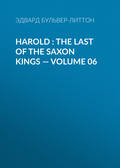
Эдвард Бульвер-Литтон
Godolphin, Complete
CHAPTER XLV
THE DECLARATION.—THE APPROACHING NUPTIALS.—IS THE IDEALIST CONTENTED?
As Godolphin returned to health, and, day after day, the presence of Constance, her soft tones, her deep eyes, grew on him, renewing their ancient spells, the reader must perceive that bourne to which events necessarily tended. For some weeks not a word that alluded to the Siren’s Cave was uttered by either; but when that allusion came at last from Godolphin’s lips, the next moment he was kneeling beside Constance, her hand surrendered to his, and her proud cheek all bathed in the blushes of sixteen.
“And so,” said Saville, “you, Percy Godolphin, are at last the accepted lover of Constance, Countess of Erpingham. When is the wedding to be?”
“I know not,” replied Godolphin, musingly.
“Well, I almost envy you; you will be very happy for six weeks, and that’s something in this disagreeable world. Yet now, I look on you, I grow reconciled to myself again; you do not seem so happy as that I, Augustus Saville, should envy you while my digestion lasts. What are you thinking of?”
“Nothing,” replied Godolphin, vacantly; the words of Lucilla were weighing at his heart, like a prophecy working towards its fulfilment: “Come what may, you will never find the happiness you ask: you exact too much.”
At that moment Lady Erpingham’s page entered with a note from Constance, and a present of flowers. No one ever wrote half so beautifully, so spiritually as Constance, and to Percy the wit was so intermingled with the tenderness!
“No,” said he, burying his lips among the flowers; “no! I discard the foreboding; with you I must be happy!” But conscience, still unsilenced, whispered Lucilla!
The marriage was to take place at Rome. The day was fixed; and, owing to Constance’s rank, beauty and celebrity, the news of the event created throughout “the English in Italy” no small sensation. There was a great deal of gossip, of course, on the occasion; and some of this gossip found its way to the haughty ears of Constance. It was said that she had made a strange match—that it was a curious weakness in one so proud and brilliant, to look no loftier than a private and not very wealthy gentleman; handsome, indeed, and reputed clever; but one who had never distinguished himself in anything—who never would!
Constance was alarmed and stung, not at the vulgar accusation, the paltry sneer, but at the prophecy relating to Godolphin: “he had never distinguished himself in anything—he never would.” Rank, wealth, power, Constance felt these she wanted not, these she could command of herself; but she felt also that a nobler vanity of her nature required that the man of her mature and second choice should not be one, in repute, of that mere herd, above whom, in reality, his genius so eminently exalted him. She deemed it essential to her future happiness that Godolphin’s ambition should be aroused, that he should share her ardour for those great objects that she felt would for ever be dear to her.
“I love Rome!” said she, passionately, one day, as accompanied by Godolphin, she left the Vatican; “I feel my soul grow larger amidst its ruins. Elsewhere, through Italy, we live in the present, but here in the past.”
“Say not that that is the better life, dear Constance; the present—can we surpass it?”
Constance blushed, and thanked her lover with a look that told him he was understood.
“Yet,” said she, returning to the subject, “who can breathe the air that is rife with glory, and not be intoxicated with emulation? Ah, Percy!”
“Ah, Constance! and what wouldst thou have of me? Is it not glory enough to be thy lover?”
“Let the world be as proud of my choice as I am.” Godolphin frowned; he penetrated in those words to Constance’s secret meaning. Accustomed to be an idol from his boyhood, he resented the notion that he had need of exertion to render him worthy even of Constance; and sensible that it might be thought he made an alliance beyond his just pretensions, he was doubly tenacious as to his own claims. Godolphin frowned, then, and turned away in silence. Constance sighed; she felt that she might not renew the subject. But, after a pause, Godolphin himself continued it.
“Constance,” said he, in a low firm voice, “let us understand each other. You are all to me in the world; fame, and honor, and station and happiness. Am I, also, that all to you? If there be any thought at your heart which whispers you, ‘You might have served your ambition better; you have done wrong in yielding to love and love only,’—then, Constance, pause; it is not too late.”
“Do I deserve this, Percy?”
“You drop words sometimes,” answered Godolphin, “that seem to indicate that you think the world may cavil at your choice, and that some exertion on my part is necessary to maintain your dignity. Constance, need I say, again and again, that I adore the very dust you tread on? But I have a pride, a self-respect, beneath which I cannot stoop; if you really think or feel this, I will not condescend to receive even happiness from you: let us part.”
Constance saw his lips white and quivering as he spoke; her heart smote her, her pride vanished: she sank on his shoulder, and forgot even ambition; nay, while she inly murmured at his sentiment, she felt it breathed a sort of nobility that she could not but esteem. She strove then to lull to rest all her more worldly anxieties for the future; to hope that, cast on the exciting stage of English ambition, Godolphin must necessarily be stirred despite his creed; and if she sometimes doubted, sometimes despaired of this, she felt at least that his presence had become dearer to her than all things. Nay, she checked her own enthusiasm, her own worship of fame, since they clashed with his opinions; so marvellously and insensibly had Love bowed down the proud energies and the lofty soul of the daughter of John Vernon.
CHAPTER XLVI
THE BRIDALS.—THE ACCIDENT.—THE FIRST LAWFUL POSSESSION OF LOVE
It was the morning on which Constance and Godolphin were to be married; it had been settled that they were to proceed the same day towards Florence; and Constance was at her toilette when her woman laid beside her a large bouquet of flowers.
“From Percy—from Mr. Godolphin, I mean?” she asked, taking them up.
“No, my lady; a young woman outside the palace gave them me, and bade me in such pretty English be sure to give them to your ladyship; and when I offered her money, she would not take anything, my lady.”
“The Italians are a courteous people,” replied Constance; and she placed the flowers in her bosom.
As, after the ceremony, Godolphin assisted his bride into the carriage, a girl, wrapped in a large cloak, pressed forward for a moment. Godolphin had in that moment turned his head to give some order to his servant, and with the next the girl had sunk back into the throng that was drawn around the carriage—yet not before Constance had heard her murmur in deep, admiring, yet sorrowful tone: “Beautiful! how beautiful!—Ah me!”
“Did you observe what beautiful eyes that young girl had?” asked Constance, as the carriage whirled off.
“What girl? I saw nothing but you!”
“Hark! there is a noise behind.”
Godolphin looked out; the crowd seemed collected round one person.
“Only a young woman fainted, sir!” said his servant seated behind. “She fell down in a fit just before the horses; but they started aside, and did not hurt her.”
“That is fortunate!” said Godolphin, reseating himself by his new bride; “drive on faster.”
At Florence, Godolphin revealed to Constance the outline of Lucilla’s history, and Constance shared somewhat of the feelings with which he told it.
“I left,” said he, “in the hands of the abbess a sum to be entirely at Lucilla’s control, whether she stay in the convent or not, and which will always secure to her an independence. But I confess I should like now, once more to visit the convent, and learn on what fate she has decided.”
“You would do well, dear Percy,” replied Constance, who from her high and starred sphere could stoop to no vulgar jealousy; “indeed, I think you could do no less.”
And Godolphin covered those generous lips with the sweet kisses in which esteem begins to mingle with passion. What has the earth like that first fresh union of two hearts long separated, and now blended for ever? However close the sympathy between woman and her lover—however each thinks to have learned the other—what a world is there left un-learned, until marriage brings all those charming confidences, that holy and sweet intercourse, which leaves no separate interest, no undivided thought! But there is one thing that distinguishes the conversation of young married people from that of lovers on a less sacred footing—they talk of the future! Other lovers talk rather of the past; an uncertainty pervades their hereafter; they feel they recoil from, it; they are sensible that their plans are not one and indivisible. But married people are always laying out the “to come;” always talking over their plans: this often takes something away from the tenderness of affection, but how much it adds to its enjoyment!
Seated by each other, and looking on the silver Arno, Godolphin and Constance, hand clasped in hand, surrendered themselves to the contemplation of their future happiness. “And what would be your favorite mode of life, dear Percy?”
“Why, I have now no schemings left me, Constance. With you obtained, I have grown a dullard, and left off dreaming. But let me see, a house in England—you like England—some ten or twenty miles from the great Babel: books, pictures, statues, and old trees that shall put us in mind of our Norman fathers who planted them; above all, a noisy, clear sunny stream gliding amidst them—deer on the opposite bank, half hidden amongst the fern; and rooks overhead: a privilege for eccentricity that would allow one to be social or solitary as one pleased; and a house so full of guests, that to shun them all now and then would be no affront to one.”
“Well,” said Constance, smiling, “go on.”
“I have finished.”
“Finished?”
“Yes, my fair Insatiable! What more would you have?”
“Why, this is but a country-life you have been talking of; very well in its way for three months in the year.”
“Italy, then, for the other nine,” returned Godolphin.
“Ah, Percy!—is pleasure, mere pleasure, vulgar pleasure,—to be really the sole end and aim of life?”
“Assuredly.”
“And action, enterprise—are these as nothing?”
Godolphin was silent, but began absently to throw pebbles into the water. The action reminded Constance of the first time she had ever seen him among his ancestral groves; and she sighed as she now gazed on a brow from which the effeminacy and dreaming of his life had banished much of its early chivalric and earnest expression.
CHAPTER XLVII
NEWS OF LUCILLA
Godolphin was about one morning to depart for the convent to which Lucilla had flown, when a letter was brought to him from the abbess of the convent herself; it had followed him from Rome. Lucilla had left her retreat—left it three days before Godolphin’s marriage; the abbess knew not whither, but believed she intended to reside in Rome. She inclosed him a note from Lucilla, left for him before her departure. Short but characteristic, it ran thus:
LUCILLA TO GODOLPHIN
“I can stay here no longer; my mind will not submit to quiet; this inactivity wears me to madness. Besides, I want to see thy wife. I shall go to Rome; I shall witness thy wedding; and then—ah! what then? Give me back. Godolphin, oh; give me back the young pure heart I had ere I loved you! Then, I could take joy in all things:—now! But I will not repine; it is beneath me. I, the daughter of the stars, am no love-sick and nerveless minion of a vain regret; my pride is roused at last, and I feel at least the independence of being alone. Wild and roving shall be my future life; that lot which denies me hope, has raised me above all fear. Love makes us all the woman; love has left me, and something hard and venturous, something that belongs to they sex, has come in its stead.
“You have left me money—I thank you—I thank you—I thank you; my heart almost chokes me as I write this. Could you think of me so basely?—For shame, man! if my child—our child were living (and O, Percy, she had thine eyes!), I would see her starve inch by inch rather than touch one doit of thy bounty! But she is dead—thank God! Fear not for me, I shall not starve; these hands can support life. God bless thee—loved as thou still art! If, years hence, I should feel my end draw near, I will drag myself to thy country, and look once more on thy face before I die.”
Godolphin sank down, and covered his face with his hands. Constance took up the letter. “Ay—read it!” said he in a hollow voice. She did so, and when she had finished, the proud Constance, struck by a spirit like her own, bathed the letter in her tears. This pleased—this touched—this consoled Godolphin more than the most elaborate comforting. “Poor girl!” said Constance, through her tears, “this must not be; she must not be left on the wide world to her own despairing heart. Let us both go to Rome, and seek her out. I will persuade her to accept what she refuses from you.”
Godolphin pressed his wife’s hand, but spoke not. They went that day to Rome. Lucilla had departed for Leghorn, and thence taken her passage in a vessel bound to the northern coasts of Europe. Perhaps she had sought her father’s land? With that hope, in the absence of all others, they attempted to console themselves.
CHAPTER XLVIII
IN WHICH TWO PERSONS, PERMANENTLY UNITED, DISCOVER THAT NO TIE CAN PRODUCE UNION OF MINDS
Weeks passed on, and, apparently, Godolphin had reconciled himself to the disappearance and precarious destiny of Lucilla. It was not in his calm and brooding nature to show much of emotion; but there was often, even in the presence of Constance, a cloud on his brow, and the fits of abstraction to which he had always been accustomed grew upon him more frequently than ever. Constance had been inured for years to the most assiduous, the most devoted attentions; and now, living much alone with Godolphin, she began somewhat to miss them; for Godolphin could be a passionate, a romantic, but he could not be a very watchful lover. He had no petits soins. Few husbands have, it is true; nor is it necessary for husbands in general. But Constance was not an ordinary woman; she loved deeply, but she loved according to her nature—as a woman proud and exacting must love. For Godolphin, her haughty step waxed timorous and vigilant; she always sprang forward the first to meet him on his return from his solitary ramblings, and he smiled upon her with his wonted gentleness but not so gratefully, thought Constance, as he ought. In truth, he had been too much accustomed to the eager love of Lucilla, to feel greatly surprised at any proof of tenderness from Constance. Thus, too proud to speak—to hint a complaint, Constance was nevertheless perpetually wounded, and by degrees (although not loving her husband less) she taught that love to be more concealed. Oh, that accursed secretiveness in women, which makes them always belie themselves!
Godolphin, too, was not without his disappointments. There was something so bright, so purely intellectual about Constance’s character, that at times, when brought into constant intercourse with her, you longed for some human weakness—some wild, warm error on which to repose. Dazzling and fair as snow, like snow your eye ached to gaze upon her. She had, during the years of her ungenial marriage, cultivated her mind to the utmost; few women were so accomplished—it might be learned; her conversation flowed for ever in the same bright, flowery, adorned stream. There were times when Godolphin recollected how hard it is to read a volume of that Gibbon who in a page is so delightful. Her affection for him was intense, high, devoted; but it was wholly of the same intellectual spiritualised order; it seemed to Godolphin to want human warmth and fondness. In fact, there never was a woman who, both by original nature and after habits, was so purely and abstractedly “mind” as was Constance; there was not a single trait or taste in her character that a sensualist could have sneered at. Her heart was wholly Godolphin’s; her mind was generous, sympathising, lofty; her person unrivalled in the majesty of its loveliness; all these, too, were Godolphin’s, and yet the eternal something was wanting still.
“I have brought you your hat, Percy,” said Constance; “you forget the dews are falling fast, and your head is uncovered.”
“Thank you,” said Percy, gently; yet Constance thought the tone might have been warmer. “How beautiful is this hour! Look yonder, the sun’s rays still upon those immortal hills—that lone grey tower amongst the far plains—the pines around—hearken to their sighing! These are indeed the scenes of the Dryad and the Faun. These are scenes where we could melt our whole nature down to love: Nature never meant us for the stern and arid destinies we fulfil. Look round, Constance, in every leaf of her gorgeous book, how glowingly is written the one sentence, ‘Love and be happy!’ You answer not; to these thoughts you are cold.”
“They breathe too much of the Epicurean and his rose-leaves for me,” answered Constance, smilingly. “I love better that stern old tower, telling of glorious strife and great deeds, than all the softer landscape, on which the present debasement of the south seems written.”
“You and your English,” said Godolphin, somewhat bitterly, “prate of the debasement of my poor Italians in a jargon that I confess almost enrages me. (Constance coloured and bit her lip.) Debasement! why debasement? They enjoy themselves: they take from life its just moral; they do not affect the more violent crimes; they feel their mortality, follow its common ends, are frivolous, contented, and die! Well; this is debasement. Be it so. But for what would you exchange it? The hard, cold, ferocious guilt of ancient Rome; the detestable hypocrisy, the secret villiany, fraud, murder, that stamped republican Venice? The days of glory that you lament are the days of the darkest guilt; and man shudders when he reads what the fair moralisers over the soft and idle Italy sigh to recall!”
“You are severe,” said Constance, with a pained voice. “Forgive me, dearest; but you are often severe on my feelings.”
Constance was silent; the magic of the sunset was gone; they walked back to the house, thoughtful, and somewhat cooled towards each other.
Another day, on which the rain forbade them to stir from home, Godolphin, after he had remained long silent and meditating, said to Constance, who was busy writing letters to her political friends, in which, avoiding Italy and love, the scheming countess dwelt only on busy England and its eternal politics:
“Will you read to me, dear Constance? my spirits are sad to-day; the weather affects them.”
Constance laid aside her letters, and took up one of the many books that strewed the table: it was a volume of one of our most popular poets.
“I hate poetry,” said Godolphin, languidly.
“Here is Machiavel’s history of the Prince of Lucca,” said Constance, quickly.
“Ah, read that, and see how odious is ambition,” returned Godolphin.
And Constance read, but she warmed at what Godolphin’s lip curled with disdain. The sentiments, however, drew him from his apathy; and presently, with the eloquence he could command when once excited, he poured forth the doctrines of his peculiar philosophy. Constance listened, delighted and absorbed; she did not sympathise with the thought, but she was struck with the genius which clothed it. “Ah!” said she, with enthusiasm, “why should those brilliant words be thus spoken and lost for ever? Why not stamp them on the living page, or why not invest them in the oratory that would render you illustrious and them immortal?”
“Excellent!” said Godolphin laughing; “the House of Commons would sympathise with philosophy warmly!”
Yet Constance was right on the whole. But the curse of a life of pleasure is its aversion to useful activity. Talk of the genius that lies crushed and obscure in poverty! Wealth and station have also their mute Miltons and inglorious Hampdens.
Alas! how much of deep and true wisdom do we meet among the triflers of the world! How much that in the stern middle walks of life would have obtained renown, in the withering and relaxed air of loftier ranks dies away unheeded! The two extremes meet in this,—the destruction of mental gifts.







